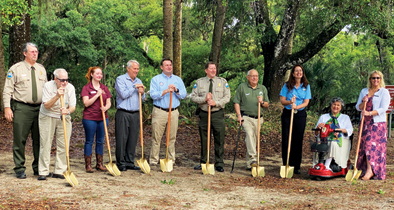
Key Points
A groundbreaking took place on March 16 at Wekiwa Springs State Park for the $1.2-million, 1.5-acre Serenity Garden, designed to be a one-of-a-kind sensory experience that will be accessible to all visitors regardless of ability.
The Serenity Garden will create a unique sensory experience with visitors being able to see, touch, smell, hear, and interact with nature. It will also provide opportunities for therapy, education, and relaxation as well as art and physical activities. The garden will be built for wheelchair accessibility up the hill from the state park’s Nature Center Pavilion.
The Wekiva Wilderness Trust, the volunteer 501(c) 3 nonprofit group that supports the work of the Wekiva River Basin State Parks, is managing the Serenity Garden project, which has taken more than four years to design.
“This day has been a long time coming, but today we’re literally making history. The Serenity Garden – a park within a park – is the only one of its kind anywhere within the United States. Hopefully, it will become the model for many more both in the United States and overseas,” said Don Philpott, president of the Trust and vice president of the Florida State Park Foundation.
“The garden is unique because it will serve as a sanctuary for a largely underserved population throughout Central Florida and further afield,” Philpott later said. “We know that there is a need because every week, I get calls from people all around the country who read about the Serenity Garden and want to know if it’s open because they want to come and visit.”
John Leaman, a Wekiva Wilderness Trust volunteer for more than 45 years, conceived of the Serenity Garden. On a Sunday morning in fall 2017, he was volunteering at the Wekiwa Springs State Park’s Nature Center Pavilion when he looked up at the slope and observed the wildflowers and butterflies there.
“I was looking at all these things that were happening and personally, in my heart, I felt tremendous peace at what I was experiencing,” said Leaman, who uses a wheelchair. “From that point on, I said, ‘We need to duplicate this for others.’ And I’m seeing the fruition of that right now.”
The Serenity Garden was delayed because a water permit had to be obtained from St. Johns River Water Management District, since the garden and the springs are within the protected zone, according to Robert Brooks, park manager for the Wekiva River Basin State Parks. The Serenity Garden will use no fertilizer so that no chemicals will run into the springs.
People have flocked to the Wekiwa Springs since 1860, making it the state’s first attraction, Brooks explained at a pres-
entation before the groundbreaking. The springs also once had a hotel for visitors, a roller-skating rink, a large and small picnic pavilion, and a toboggan that users could ride and splash into the water.
The Wekiwa Springs attract about 500,000 visitors per year.
An extended story appears in the Friday, March 25, issue of The Apopka Chief. Subscribe today!
The Apopka Chief and The Planter are weekly community newspapers, independently owned and family operated, that have served the greater Apopka area in Central Florida since 1923 and 1965 respectively.
Follow The Apopka Chief on Facebook.
Follow The Apopka Chief on Twitter.
Follow The Apopka Chief on Instagram.
Suggested Articles
No related articles found.


